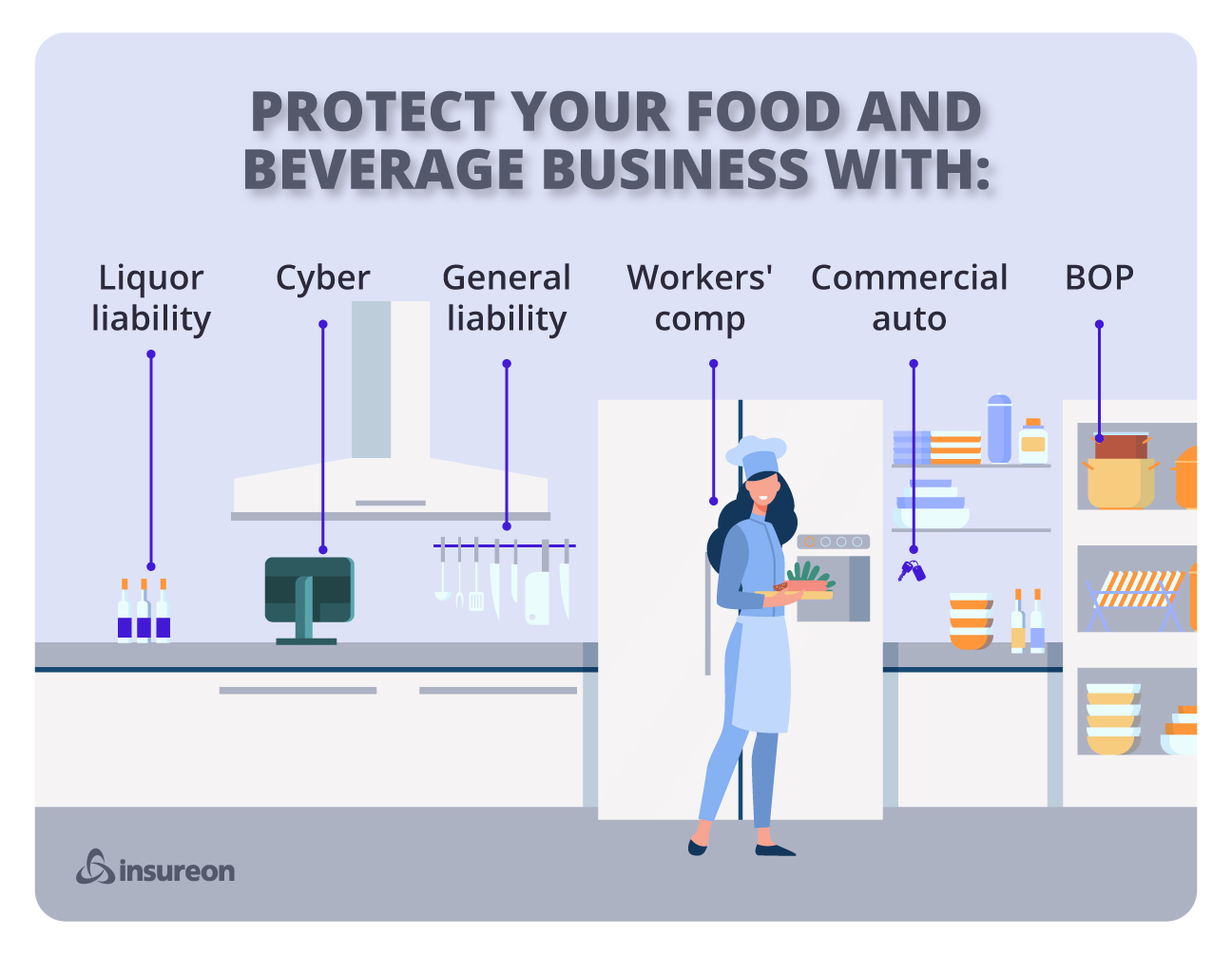
Top food businesses we insure
Recommended food and beverage business insurance policies
Business insurance can help keep your doors open despite an injury, kitchen fire, or lawsuit. Insureon helps food and beverage businesses find the policies that match your unique risks.
Business owner’s policy
A BOP bundles commercial property insurance and general liability insurance in one plan. It’s often the most cost-effective type of business insurance for bars and restaurants.
- Customer bodily injuries
- Damaged business property
- Business interruption incidents
Workers’ compensation insurance
Most states require workers' comp for restaurants and bars that have employees. It also protects sole proprietors from work injury costs that health insurance might deny.
- Employee medical expenses
- Disability benefits
- Legal costs from lawsuits
General liability insurance
This policy covers the most common food and beverage business risks, including customer injury, personal property damage, and advertising injuries. It’s required for most commercial leases.
- Slip-and-fall accidents
- Damaged customer property
- Libel or slander lawsuits
Commercial auto insurance
This policy covers legal costs and property damage in an accident involving your business vehicle. It also covers vehicle theft and vandalism.
- Physical damage and collision coverage
- Injuries caused to another person
- Repairs due to vandalism or weather
Liquor liability insurance
This policy covers legal fees, settlements, and medical costs if your restaurant or bar serves alcohol to someone who then harms others or damages property.
- Injuries caused by intoxicated patrons
- Property damage caused by intoxicated patrons
- Legal defense costs
Cyber insurance
This policy, also called cyber liability insurance, helps restaurants and other food service businesses recover from cyberattacks and data breaches. It's recommended for any business that stores customer information.
- Data breach notification costs
- Fraud monitoring services
- Cyber extortion payments
How much does food and beverage business insurance cost?

When calculating food and beverage insurance costs and premiums, insurance companies look at several factors, including:
- The types of food and beverages served
- Business equipment and property
- Annual business revenue
- Where your business operates
- The number of employees you have on staff
- Your policy limits and deductible

How do I get food and beverage business insurance?
It’s easy to find insurance for food and beverage businesses. Whether you run a bakery, deli, candy store, or food truck, you’ll need to have some basic information about your business available.
Our application will ask you for your annual revenue and payroll, among other details. You can buy a policy online and get a certificate of insurance that verifies your insurance coverage with Insureon in three easy steps:
- Complete a free online application.
- Compare free quotes and choose a policy.
- Pay for your policy and download a certificate for proof of insurance.
Insureon's licensed insurance agents work with top-rated U.S. providers to find the right insurance plan for your food business, whether you’re a one-person cake maker or catering company with multiple employees.
Verified business insurance reviews
Hear from customers like you who purchased small business insurance.
How to get workers' comp insurance
Common questions about food and beverage business insurance
Do businesses that serve or sell food need product liability insurance?
Simply put, yes. If you sell, make, or distribute products, you likely need product liability insurance. Any business in the supply chain, from manufacturers to wholesalers to restaurants, could be blamed if a product causes harm, and there are few limitations on who can file a product liability lawsuit.
This policy protects against claims related to:
- Allergic reactions
- Food contamination
- Marketing defects, such as labeling errors or lack of warnings
If a customer gets sick after eating or drinking at your restaurant, food cart, or coffee shop, this policy can help pay for attorney's fees, court-ordered judgments, and other costs.
Does general liability cover food poisoning?
General liability insurance can protect food and beverage businesses from several liability risks, including a customer slipping and falling on a wet floor in your establishment or getting food poisoning from consuming undercooked or spoiled food.
While a general liability policy will protect your company from food poisoning claims, it won't cover spoiled perishable goods. If your business handles perishable goods that must maintain a specific temperature, spoilage insurance will help cover losses if your refrigeration equipment unexpectedly breaks or is interrupted by a power outage.
This type of coverage can be added to your commercial property coverage or business owner's policy. To find out if this endorsement is right for your business, speak with a licensed Insureon insurance agent.
If I have to temporarily close my business am I covered by insurance?
Business interruption insurance, sometimes called business income insurance, can cover costs if your business is forced to close temporarily due to a catastrophic event, such as a fire. This policy can help cover your day-to-day operating expenses and lost revenue, and even relocation if it's necessary.
Additionally, extra expense coverage can provide funds to help your business while recovering from a major disruption. Extra expense insurance would help pay for costs such as:
- Moving your business to a temporary location until your main building is restored
- Buying or leasing additional equipment for the temporary site
- Paying employees overtime or hiring short-term works during the transition
What other insurance policies should food service businesses carry?
There are several additional types of insurance policies beverage and food businesses should consider including in their risk management plan, whether you run a single business location or multi-location franchise:
- Employee dishonesty coverage, a type of fidelity bond, which protects your clients from various financial losses caused by dishonest employees, such as stolen property, credit card fraud, and forgery.
- Equipment breakdown coverage protects your company's computers, electrical systems, production machinery and other equipment from sudden and accidental malfunctions that commercial property insurance typically excludes.
- Electronic data processing (EDP) insurance covers you electronic data processing equipment, such as data storage devices, backup systems, and software, against data loss during a power surge, natural disasters, or similar incidents.
- Employment practices liability insurance (EPLI) safeguards your business from lawsuits over employment-related issues, such as an employee claiming their civil rights were violated or they were unable to complete their work in a fair environment.
- Hired and non-owned auto (HNOA) insurance provides auto liability coverage for accidents involving personal, leased, or rented vehicles used by your business and its employees.

Want free expert advice right in your inbox?
By entering your email address and subscribing, you agree to our Terms of Use and Privacy Policy
Read our blog posts

Thank you for being the economic backbone of our communities. Behind every small business is a story of independence and resilience, from late nights and big ideas to the courage to bet on...

Vendors like artisans, bakers, and concessionaires face unique risks, and often need insurance to appear at a venue. Learn how vendor liability insurance can protect your business and provide you...


























